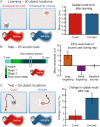Strengthening individual memories by reactivating them during sleep - PubMed (original) (raw)
Strengthening individual memories by reactivating them during sleep
John D Rudoy et al. Science. 2009.
Abstract
While asleep, people heard sounds that had earlier been associated with objects at specific spatial locations. Upon waking, they recalled these locations more accurately than other locations for which no reminder cues were provided. Consolidation thus operates during sleep with high specificity and is subject to systematic influences through simple auditory stimulation.
Figures
Fig. 1
(A) Individuals learned object-location associations while hearing object sounds. Accuracy at the final stage of learning was matched for objects subsequently cued or not cued by the sounds (mean ± SE). (B) Sleep-staging data are shown for a representative participant, including the 3.5-min sequence of 25 sound cues. Vertex EEG responses differed according to level of forgetting for corresponding object locations. (C) After the nap, individuals attempted to place each object in its correct location (arrows simulate motion of objects as individuals complete the task). Better spatial-location retention for cued compared to uncued objects was reflected by a smaller change in error (_t_11 = 3.2, p < .01).
Similar articles
- Targeted memory reactivation during sleep to strengthen memory for arbitrary pairings.
Vargas IM, Schechtman E, Paller KA. Vargas IM, et al. Neuropsychologia. 2019 Feb 18;124:144-150. doi: 10.1016/j.neuropsychologia.2018.12.017. Epub 2018 Dec 21. Neuropsychologia. 2019. PMID: 30582944 - Boosting Vocabulary Learning by Verbal Cueing During Sleep.
Schreiner T, Rasch B. Schreiner T, et al. Cereb Cortex. 2015 Nov;25(11):4169-79. doi: 10.1093/cercor/bhu139. Epub 2014 Jun 23. Cereb Cortex. 2015. PMID: 24962994 - The Benefits of Targeted Memory Reactivation for Consolidation in Sleep are Contingent on Memory Accuracy and Direct Cue-Memory Associations.
Cairney SA, Lindsay S, Sobczak JM, Paller KA, Gaskell MG. Cairney SA, et al. Sleep. 2016 May 1;39(5):1139-50. doi: 10.5665/sleep.5772. Sleep. 2016. PMID: 26856905 Free PMC article. - How Targeted Memory Reactivation Promotes the Selective Strengthening of Memories in Sleep.
Lewis PA, Bendor D. Lewis PA, et al. Curr Biol. 2019 Sep 23;29(18):R906-R912. doi: 10.1016/j.cub.2019.08.019. Curr Biol. 2019. PMID: 31550479 Review. - The whats and whens of sleep-dependent memory consolidation.
Diekelmann S, Wilhelm I, Born J. Diekelmann S, et al. Sleep Med Rev. 2009 Oct;13(5):309-21. doi: 10.1016/j.smrv.2008.08.002. Epub 2009 Feb 28. Sleep Med Rev. 2009. PMID: 19251443 Review.
Cited by
- Generalization of word meanings during infant sleep.
Friedrich M, Wilhelm I, Born J, Friederici AD. Friedrich M, et al. Nat Commun. 2015 Jan 29;6:6004. doi: 10.1038/ncomms7004. Nat Commun. 2015. PMID: 25633407 Free PMC article. - Humans can learn new information during sleep.
Arzi A, Shedlesky L, Ben-Shaul M, Nasser K, Oksenberg A, Hairston IS, Sobel N. Arzi A, et al. Nat Neurosci. 2012 Oct;15(10):1460-5. doi: 10.1038/nn.3193. Epub 2012 Aug 26. Nat Neurosci. 2012. PMID: 22922782 - Inducing forgetting of unwanted memories through subliminal reactivation.
Zhu Z, Anderson MC, Wang Y. Zhu Z, et al. Nat Commun. 2022 Oct 30;13(1):6496. doi: 10.1038/s41467-022-34091-1. Nat Commun. 2022. PMID: 36310181 Free PMC article. - Hippocampal signatures of awake targeted memory reactivation.
Alm KH, Ngo CT, Olson IR. Alm KH, et al. Brain Struct Funct. 2019 Mar;224(2):713-726. doi: 10.1007/s00429-018-1790-2. Epub 2018 Nov 26. Brain Struct Funct. 2019. PMID: 30478610 Free PMC article. - Sleep-dependent consolidation of value-based learning.
Baran B, Daniels D, Spencer RM. Baran B, et al. PLoS One. 2013 Oct 9;8(10):e75326. doi: 10.1371/journal.pone.0075326. eCollection 2013. PLoS One. 2013. PMID: 24130703 Free PMC article.
References
- McGaugh JL. Science. 2000;287:248–251. 2000. - PubMed
- Paller KA. In: Encyclopedia of Neuroscience. Squire LR, editor. Academic Press; Oxford: 2009. pp. 741–749.
- Born J, Rasch B, Gais S. The Neuroscientist. 2006;12:410–424. - PubMed
- Stickgold R, Hobson JL, Fosse R, Fosse M. Science. 2001;294:1052–1057. - PubMed
- Rasch B, Büchel C, Gais S, Born J. Science. 2007;315:1426–1429. - PubMed
Publication types
MeSH terms
LinkOut - more resources
Full Text Sources
Other Literature Sources
Medical
